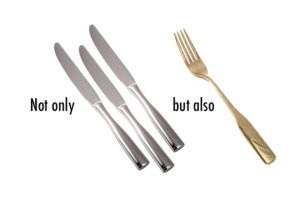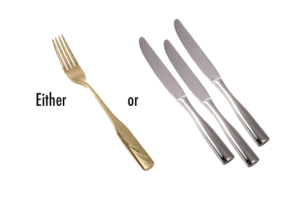Today let’s talk about how to make sure subjects and verbs agree when a word like “or” comes into play.
There can be more to this than meets the eye.
This grammar game begins with a few terms to help you keep the rules in hand.
- The subject is the person, thing, or idea directing the verb.
- The verb is the action (e.g., “catch”) or occurrence (e.g., “happen”) or state (e.g., “seem”).
Subjects and verbs are supposed to agree in number—singular with singular, plural with plural. That means “one girl is” while “five girls are.”
- Conjunctions join words to words, phrases to phrases, and whole thoughts to whole thoughts. And, but, and or are a few examples.
You may not be familiar with the term correlative conjunction. These are joining words that correlate—or match—two equal parts of a sentence to each other. We’ll call them correlatives for short. These conjunctions come in pairs:
- either/or
- neither/nor
- not only/but also
- not/but
With these grammar terms in mind, let’s use them to talk more about subject-verb agreement.
What to Do With Singulars?
The conjunction and works as a plus sign to make a singular subject + a singular subject = a plural subject that needs a plural verb:
Fred and Tom arethe names of my hamsters.

Something different happens when we replace the word and with the word or. The verb has to be singular:
Sometimes I can’t remember if Frank or Francis is the name of my sister’s goldfish.

When we join singular subjects with correlatives (remember them?), the subject-verb relationship follows the same rule as when we use the word or:
Neither Patrick nor Jessica is my favorite name for a parakeet.

How About Singulars and Plurals?
Yet something different happens when we use a correlative to join a singular subject and a plural subject. The subject closest to the verb directs the verb. That’s all you need to focus on:
Singular: Not only her three silver knives, but also her one gold fork needs polishing.

Plural: Either his one gold fork or his three silver knives need polishing.

You have the rules of the game in hand, so when you write, go ahead and show your cards.

Ellen Feld
Writing Academy Co-Instructor
Ellen Feld has worn a variety of editorial hats, including newspaper reporter and copy chief, personal essayist, website reviewer, writing coach, and creator/instructor of online grammar refresher courses, enjoyed by 43,000 students. She’s the author of the children’s storybook Paragon and Jubilee.

